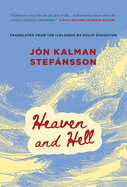
Jón Kalman Stefánsson (Your Absence Is Darkness) published Heaven and Hell in his native Iceland in 2008. This evocative English translation by Philip Roughton is sure to reinvigorate interest in this first volume of a trilogy that follows an unnamed young man navigating life after loss. Like the short fishing expedition at the center of the protagonist's experience, the novel is slight but contains unexpected depths. In fact, much of the lyrical text will put readers in mind of the sea or a deceptive fall of water that seems to tumble lightly over rock while containing an icy force.
The novel opens with a sort of invocation entitled "We Are Nearly Darkness," which establishes the narrative voice, a chorus of storytellers and memory keepers who "know a little about life and a little about death, and can tell of it: we come all this way to touch you, to set fate in motion." Heaven and Hell then follows the boy and his companion, Bárður, as they and their small crew prepare to go to sea, bringing along a borrowed copy of John Milton's Paradise Lost. Stefánsson's long clauses, endlessly rocking one to the next, inhabit the rhythm of the ocean, and while his plot is thin, it raises profound questions such as, "If only existence were always so direct and easily readable, if only we could escape the uncertainty that reaches out over graves and death. But what softens uncertainty if death does not?" This beautiful novel provides a reminder of the smallness of humanity and the power of community--and of words--to keep the darkness at bay. --Sara Beth West, freelance reviewer and librarian

